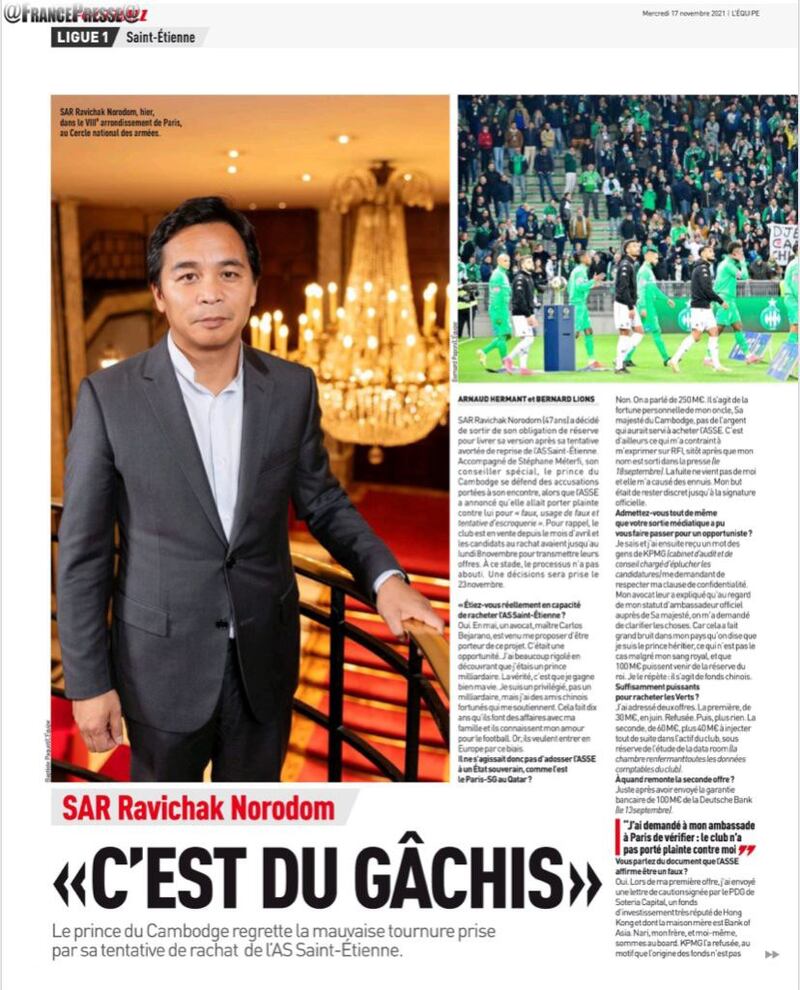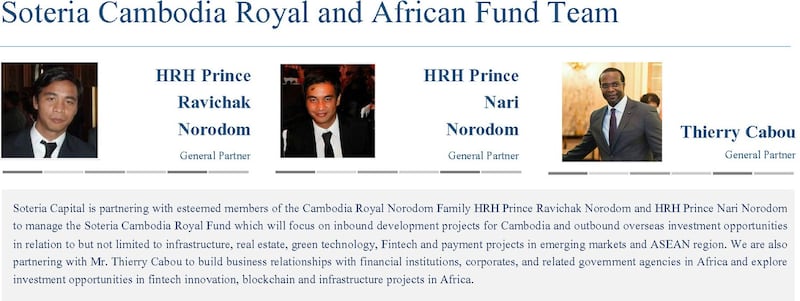The remarkable tale of Cambodian Prince Norodom Ravichak’s abortive takeover of French soccer club Saint Etienne took even more bizarre twists when the prince granted an interview to sports daily L’Equipe.
Published in a two-page spread on Nov. 17, the Q&A was illustrated with a photo of the besuited prince taken the day before at a leisure club for serving and retired military officers in the French capital’s tony eighth arrondissement.
The current owners of Saint Etienne had announced their intention to file a criminal complaint against Ravichak the previous week for "acts of forgery, use of forgery and attempted fraud" in relation to his proposal to purchase the club. Specifically, they alleged that the 100 million euro ($113 million) bank guarantee he had submitted in support of his bid was a fake.
Ravichak, who is a nephew of Cambodia’s King Norodom Sihamoni, clearly intended to put the allegations to rest during the interview. In doing so, he introduced to the public a motley crew of colorful associates. And in attempting to explain away the irregularities that had so alarmed Saint Etienne’s owners, the self-styled businessman and philanthropist invited more questions than he answered.

Dubious document
Dated Sept. 13 of this year and bearing the letterhead of German finance giant Deutsche Bank, the first sign that something might be amiss with the now-infamous bank guarantee is the signature of Marcus Schenck, who was deputy CEO of the bank until he left it in 2018.
Typed entirely in upper case, the letter – which has not been made public – claims that the bank is “ready, willing and able to issue a standby letter of credit” in the amount of 100 million euros “specially to guarantee the buy and sale agreement” for an unnamed “sports project.”
It continues that the beneficiary of this letter of credit would be Prolan Trading Pte Ltd, a Singaporean company of which Ravichak is the representative and authorized signatory, according to the letter. Official records with the Singaporean business registry tell a different story.
Prolan Trading was established on May 25 this year, just over a month after Saint Etienne’s owners officially announced their intention to sell. Its sole shareholder and director is Singaporean businessman Mohammed Maideen, who told RFA on Nov. 9 that he was unaware of his company’s name being used in the bid for Saint Etienne. The following day he filed a request that Prolan Trading be struck off the business registry, records show.
Deutsche Bank’s press office did not respond to multiple requests for comment.

A tale of two Prolans
Speaking to L’Equipe on Nov. 16, Ravichak disavowed any responsibility for the seemingly fake bank guarantee. That had been procured on his behalf by French real estate entrepreneur Philippe Soulie and his conveniently named Swiss company Prolan Group SA, the prince said.
“If anyone was at fault, it was whoever issued this document, Prolan or Deutsche Bank. I have nothing to reproach myself for,” Ravichak told L’Equipe.
Approached for comment, Soulie repeatedly avoided answering the question of whether he had indeed arranged the bank guarantee, although he insisted that there had been “nothing false from our side.”
Citing confidentiality agreements, Soulie refused to be drawn on his role in the failed transaction, the content of the bank guarantee or the role of the Singaporean company featured on it, Prolan Trading, whose name bears more than a passing resemblance to his own Prolan Group.
For his part, Maideen told RFA that if Prolan Trading’s name had ended up on a bank guarantee in September, it was without the permission of the company’s sole director and shareholder: him. He added that while he had recently become acquainted with Soulie’s Prolan Group, he had done “no business [with them] yet.”
Friends with deep pockets
One thing Soulie was keen to stress is that Ravichak is not short of contacts with deep pockets.
“The prince has enough contacts and investors,” Soulie wrote in a message. “If he didn’t buy [the club] that’s probably about the value of the club, no?”
He hinted that more than a few of those wealthy connections were party to the prince’s bid for Saint Etienne, which he said had involved “a lot of intermediaries.”
In his interview with L’Equipe, Ravichak was unequivocal that the 100 million euros was never his to begin with. “This is Chinese money,” he said.
The prince also revealed that prior to the appearance of the Deutsche Bank guarantee, he had made an earlier 30 million euro bid for Saint Etienne, although he insisted that both offers were tendered “always with the same source of funds.”
“For my first offer, I sent a letter of guarantee signed by the CEO of Soteria Capital, a well-known Hong Kong investment fund whose parent company is Bank of Asia,” the prince told L’Equipe. “Nari [Prince Norodom Narithipong], my brother, and I are on the board.”
The Soteria Capital-backed bid was refused, according to Ravichak, because Saint Etienne’s accountants declared “that the source of the funds is not verifiable.”
A Soteria Capital pitch deck marked “Strictly Private & Confidential” and seen by RFA shows Ravichak and his brother Narithipong are responsible for managing the Soteria Cambodia Royal Fund. The fund, whose name seems to trade on the brothers’ links to the Cambodian monarchy, focuses on development projects in Cambodia as well as overseas investments, according to the presentation.
Metadata for the pitch deck shows that it was created this April, the same month that Saint Etienne’s owners announced their intention to sell. Hong Kong company records show Soteria Capital has only had an asset management license since January of this year, when it acquired a licensed business.
Bank of Asia, Soteria Capital’s parent company, is a digital bank in the British Virgin Islands, a notorious financial secrecy jurisdiction. The bank was founded in 2017 by Carson Wen, a former three-term deputy of the National People’s Congress, China’s national legislative body.
In an interview with Bloomberg shortly after the bank opened for business Wen explained that his target market was the 50 percent of offshore companies registered in the British Virgin Islands who were believed to be unable to find a bank willing to take their custom.
Wen very publicly fell out with American banker Chad Holm, who was essentially a co-founder in Bank of Asia. A 2018 Eastern Caribbean Supreme Court judgement in the dispute revealed that Holm had been introduced to Wen by the latter's "sort of advisor" Azura Mangunhardjono. For years, Mangunhardjono posed as a wealthy Hong Kong socialite until a 2019 investigation by the South China Morning Post revealed her to be a serial fraudster, duping wealthy lovers and friends out of hundreds of thousands of dollars.
Soteria Capital and its representatives did not respond to requests for comment.
Soccer’s new normal
For soccer fans uninterested in the businesses behind the beautiful game, there may be plenty of surprising elements to Ravichak's bid for Saint Etienne, which he contends is "in the interest of the club and its supporters." After all, it is not every day that the nephew of a reigning monarch consents to act as a front for Chinese capital looking to take control of a top-tier European club. Much less that the bid would be mired by an allegedly forged bank guarantee from one of the world's largest financial institutions. Or that the fake guarantee would bear the details of a company owned by a man claiming to be totally unaware that his business's name was wrapped up in the 100 million euro transaction.
For soccer journalist James Montague, however, the situation is all too familiar. His 2017 book, The Billionaire's Club: The Unstoppable Rise of Football's Super-rich Owners, examined the genuine billionaires who own the world's biggest teams and their influence on the game. Just as common, though, are chancers looking to leverage one of the world's most popular sports for a quick buck, he told RFA.
“Once you scratch the surface of football ownership, it’s basically a wild west where nobody’s held to account, and it attracts the kind of people who as quickly as they take over a club they disappear,” Montague said. “I can’t think of another industry that attracts a larger number of weirdos.”
Often, he said, buyers will take control of a club with promises to invest in its rejuvenation but will instead saddle the club with as much debt as possible before vanishing.
“Anyone who has financial acumen can work out how to navigate this world and turn a profit from a club if they don’t care for the consequences,” he added. “Somebody else will always pick up the pieces because clubs aren’t businesses, they’re social institutions.”
